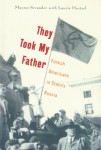They Took My Father by Mayme Sevander with Laurie Hertzel (1992: University of Minnesota Press. IDBN 978-0-8166-4336-3)
One great thing about working on a new historical novel (my manuscript of the ties between Karelia, Finland, and Estonia tentatively entitled Sukulaiset: The Kindred) is that I get to read all sorts of background material. I am dedicated, as a fiction writer, to telling the truth despite the fact that the genre I write in seems contradictory to that goal. But in crafting an imaginary world from real events, detail is important. Consistency is required. And so, I do the dog-tiring research necessary to a book. Even when working out of my genre (as I recently did in completing Laman’s River, a contemporary crime novel about fundamental Mormonism) I spend as much time on background and research as I do writing and editing a book. That’s my work ethic: Try and make the tale ring true no matter the genre, no matter the setting, no matter the time frame of the story.
Sukulaiset is being molded out of images and words from the period of Karelian Fever: The early 1930s when Finnish Canadians and Finnish Americans left North America to seek Communist utopia in the U.S.S.R. My research has included reading (twice) Karelia: A Finnish-American Couple in Stalin’s Russia (see below for a review) as well as hundreds of pages of web material. Before beginning the book, I knew that Mayme Sevander (born in NW Wisconsin and the daughter of Communist organizer and newspaper editor, Oscar Corgan) had written a memoir about her experiences in the U.S.S.R. She was a child immigrant during Karelian Fever who stayed in Karelia, paying, as the book describes, a terrible price for her faith (and her parents’ faith) in Marxism. I also was aware of some tension between the Finnish American community and noted Professor of Russian History (and a specialist in Karelian Fever) Dr. Alexis Pogorelskin as to the accuracy and tone of Ms. Sevander’s description of her father’s role in the mass exodus of Finns from North America. I don’t know the details of the rift; only that, in putting together a DVD regarding the episode, Dr. Pogorelskin didn’t necessarily agree with Ms. Sevander as to the details of the Karelian Fever story. Despite this conflict (and my respect for Dr. Pogorelskin) I picked up a copy of They Took My Father from Barnes and Noble. Here’s what I think.
The book is fascinating memoir: A top notch effort in terms of pace, tone, detail, editing and writing. While there may be differences of opinion amongst academics and serious students of Karelian Fever as to each principal’s role in the debacle (for that is what it turned out to be) Ms. Sevander’s eyewitness recounting of what she and her family endured at the hands of Stalin is a remarkable addition to this category of non-fiction. Ms. Hertzel crafted Ms. Sevander’s story into a readable, organized rendition of hope, fear, and ultimately, anguish that bears reading if you have any interest in the Finns, Karelia, Soviet history, or the like. My only criticism is that the book could have spent the same detail recounting Ms. Sevander’s life after World War II as it devoted to the family’s early years in Karelia. Folks picking up the book would likely be eager to learn about the day-to-day struggles, hardships, and intrigues that made life under Soviet rule really a game of human chess: Knowing when and not to telegraph ones intentions and moves.
All in all, a valuable asset in my attempt to understand a little known piece of Finnish American history. 4 and 1/2 stars out of 5.



